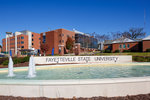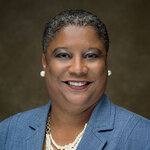

Faculty at Fayetteville State University will hold a no confidence vote on Friday regarding Provost Monica Terrell Leach, the school’s chief academic officer.
The Faculty Senate is scheduled to vote on its no confidence resolution during a virtual meeting at 2 p.m. Professors are angry that Leach is advancing a plan to require full-time faculty to teach four classes per semester instead of the current minimum load of three classes, several faculty members said in interviews this week and last week.
That is just the latest of their gripes with Leach and the campus administration. The resolution the Faculty Senate will consider on Friday lists 13 complaints across two pages.
The resolution says ongoing problems and disputes have led to “a pervasive culture of fear, intimidation, and retaliation inhibiting the free expression of concerns and ideas essential for academic freedom, integrity, and the achievement of the university’s mission.”
Friday’s vote by the Faculty Senate, which has about 40 senators representing instructors from across the campus, is the faculty’s way to send a message of dissatisfaction to Leach and the university’s administration in general.
The faculty say they have tried to get their concerns resolved internally, but those efforts failed.
Extra teaching workload coming in the fall
The plans for a no confidence vote against the provost follow an act of protest last week in which around eight faculty members went on Thursday to the university’s quarterly Board of Trustees meeting and gave each trustee a two-page letter outlining their workload complaint and other grievances.
Faculty members told CityView this week and last week their teaching workload will rise by 33% in the fall. At the same time, instructors expect other job mandates, to do research or creative work, plus service work, will not be reduced.
Fayetteville State is crafting its new workload policy to comply with the new directive from the UNC System, the provost said in a written statement to Cityview.
Fayetteville State had 6,847 students in the fall semester. Its class sizes vary based on the topic, academic level and other factors.
Tyechia V. Paul, an assistant professor of management in Fayetteville State’s Broadwell College of Business and Economics, said her classes have up to 50 students each. With the new policy, she could go from a maximum of 150 students per semester to 200 students.
The added teaching workload will make it harder for the professors to give each student as much attention and feedback as they have been giving to ensure the students are learning, said associate professor Zahra Shekarkhar, the chairwoman of the Faculty Senate who teaches criminal justice.
Other faculty members agree.
“Folks are already saying, ‘This is going to become a multiple-choice campus,’” said Associate Professor Kim Hardy, who teaches social work. This means that instead of administering tests where students have to provide written answers or otherwise show their work, some instructors may start using multiple-choice tests. Multiple choice tests are easier and quicker to grade, she said.
The new workload policy is not yet final, as it has not yet been approved by the university’s Board of Trustees, which is Fayetteville State’s governing body. But, Shekarkhar said, faculty members are already being assigned four classes instead of three for the upcoming fall semester.
“Departments were told to schedule everybody for 12 credit hours, or four courses, in the fall,” Shekarkhar said.
Chancellor Allison responds to complaints
Chancellor Darrell T. Allison is aware the faculty is upset.
“I actually see this as an opportunity for us to look and self-examine, starting with me,” he said in an interview Tuesday with CityView.
“What more can we do?” Allison said. “Because the way I operate as a leader, the way I’ve been demonstrating since March 15, 2021, [when he took office as chancellor], we’re going to do this thing collectively. We’re going to do this thing together.”
There won’t be overnight results, he said, and “we won’t get everything right. But starting with me leading by example. And hopefully, that takes root here on campus.”
After the faculty delivered the complaint letter to the Board of Trustees, Allison scheduled a town hall meeting with them for April 12.
New teaching standards for all N.C. public universities
The provost said in her statement on Tuesday that the Fayetteville State teaching workload policy will account for instructors’ other job expectations.
“This FSU policy is a requirement by the UNC System and must be brought to the FSU Board of Trustees for approval at its next meeting,” Leach said.
Leach was referring to a recently updated teaching workload policy and supporting rule that the Board of Governors of the University of North Carolina System enacted in summer 2023 and in February. The Board of Governors, a 24-member board elected by the N.C. General Assembly, oversees Fayetteville State and the state’s 15 other public universities.
“The expectation of the policy is to ensure that faculty workload upholds the university’s mission and provides outcomes for student success,” Leach said. “The policy will include allowances for differential teaching loads for faculty who are engaged in research/creative and service activities as such activities are defined in the UNC System policy.”
The new UNC System policy sets a baseline that faculty at the 16 university campuses across the state will teach 24 credit hours per academic year, which in general works out to four classes per semester.
That’s 10 hours per week of instructional time, with additional time needed for preparation, for office hours to meet with students, and for grading tests and homework assignments.
A Feb. 23 memo from Leach to the faculty and administration says a group of 16 faculty members and administrators met for five weeks to discuss how Fayetteville State will implement the UNC System policy.
Leach asked in the memo for Fayetteville State’s four colleges to plan for a teaching workload of four classes per semester, saying “it is critical that we remain in compliance with the UNC system faculty workload policy.”
The system’s prior workload policy was not without problems, according to a presentation from the UNC Board of Governors in May. For example, the presentation says, the old policy looked at averages, not at individual contributions, and did not take class size or research into consideration.
The Board of Governors replaced the old policy in July.
The UNC System gave the trustees at each of the 16 universities a deadline of June 30 this year to create their own policies to implement the new directive. The schools are to establish new workload policies plus programs for reporting back to the UNC System how much time the faculty spends on teaching, research or creative work, and on service.
“As teaching and instruction are the primary mission of the constituent institutions, teaching shall serve as the first component of determining faculty workload expectations,” the UNC System policy says.
Statewide policy has flexibility
While that policy indicates a full-time faculty member would be teaching four classes per semester, it also says the teaching load can be adjusted to accommodate their other tasks.
The faculty are required to do research or creative activities within the mission of their universities, the policy says. They also are required to perform service.
Examples of research or creative work include:
Service work can include administrative duties and “providing service to their disciplines and their communities [through] a variety of activities,” the UNC System policy says.
For example, Shekarkhar, the chair of the Faculty Senate, said in the criminal justice profession, her service work includes assisting with the publication of an academic journal and with an annual conference of professionals and researchers.
On campus, Shekarkhar is the graduate student coordinator in the criminal justice program, she said. “That’s something I do not get compensated for” and it counts as service to her department and the university as a whole, she said.
Fayetteville State faculty riled up
The workload issue is just one of the items in the letter of complaint faculty members gave to the Board of Trustees on March 28.
Some other grievances:
In an email to CityView on Tuesday, Allison said he is listening to their concerns.
“It’s healthy to hear from our faculty and I am not opposed to them sharing their concerns,” he said. “This is a part of leading an organization. I have an open-door policy for meeting with faculty and students and I have kept my commitment to this practice. While I may not be able to fix every problem that comes my way, I listen, and I work very collaboratively with my team to fix the things that we can.”
Kimberly Jeffries Leonard, the chairwoman of the Board of Trustees, sent a statement to CityView in response to the faculty’s letter.
“We are confident that through communication and mutual understanding between the Chancellor, the Provost and the Faculty Senate, these concerns will be addressed,” she said. “We value input from every member of the University family as we collectively work towards our mission.”
Senior reporter Paul Woolverton can be reached at 910-261-4710 and pwoolverton@cityviewnc.com.
This story was made possible by contributions to CityView News Fund, a 501c3 charitable organization committed to an informed democracy.